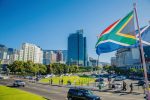In a historic move for South African municipalities, Electricity and Energy Minister Kgosientsho Ramokgopa has granted the eThekwini Metropolitan Municipality formal approval to procure 400 megawatts (MW) of electricity generation capacity—ushering in a new era of municipal-led energy procurement.
The minister’s Section 34 determination, officially published in the Government Gazette, authorises the city to source 100MW from solar energy and 300MW from natural gas through an independent and transparent tendering process.
“The new generation capacity is needed to ensure continued, uninterrupted electricity supply,” the gazetted notice reads. “The procurement process must be fair, equitable, transparent, competitive, and cost-effective.”
eThekwini becomes the first metro in South Africa to receive national approval to procure its own power generation capacity, a significant step away from sole reliance on Eskom. Former mayor Mxolisi Kaunda hailed the decision as a “new era of municipal-led generation,” describing it as a long-awaited move toward energy security and resilience.
The city’s current mayor, Cyril Xaba, echoed this sentiment, calling the approval a critical milestone.
“We are excited to be the first metro in the country to receive this determination. It sets a precedent and reinforces the constitutional role of municipalities in delivering quality services,” said Xaba.
The journey to this milestone began in July 2021, when eThekwini issued a technology-neutral Request for Information (RFI) to assess market readiness for procuring 400MW of renewable and alternative energy.
“This allowed us to engage with industry stakeholders, gauge investment appetite, and lay the foundation for meaningful public-private partnerships,” said Xaba.
By mid-2022, the municipality’s 400MW business case had been endorsed by the KwaZulu-Natal Provincial Government, followed by National Treasury approval. In 2023, eThekwini hosted its first Energy Transformation Summit, signalling a strong commitment to a low-carbon, inclusive energy future.
Later that year, the city submitted its official Section 34 Determination application, which was reviewed and advanced by Minister Ramokgopa. A public participation process led by NERSA followed in March 2025. Final ministerial approval was confirmed in August 2025.
The city will roll out the project in phases:
December 2025: Release of the Request for Proposals (RFP) to procure the initial 100MW of solar capacity
September 2026: Expected start of construction on solar projects
2026: Release of RFP for 300MW of gas-to-power generation
“This staggered approach allows us to align with demand patterns, build local capacity, and manage implementation risks more effectively,” Xaba explained.
Despite the momentum, industry experts and analysts have raised red flags regarding the feasibility of the 300MW gas component. According to EE Business Intelligence, Durban currently lacks the infrastructure to support gas-to-power operations, including:
A secured gas supply
LNG import and storage facilities
Regasification plants
Transmission pipelines
Without these, experts caution that the gas portion of the project could stall unless a reliable and competitively priced fuel source is secured.
Regardless of the gas-related hurdles, the move represents a major shift in how local governments can play a direct role in securing energy stability. It’s also expected to reduce load-shedding, enhance service delivery, and lay the groundwork for public-private energy partnerships across the country.
“Tourism, business, and households all depend on reliable electricity,” said Xaba. “This project is not just about supply—it’s about building a resilient, future-ready city.”
Main Image: Mercury










